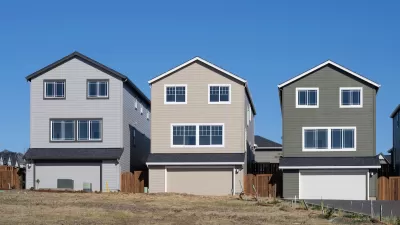There are more rental units in the United States than ever, but fewer of them are available at low cost, so there are more cost-burdened renters than ever, according to new research.

A new working paper from researchers at the Joint Center for Housing Studies documents the decline of low-cost rental units over the past three decades and its impact on low-income renters.
"Although the overall rental stock grew by 10.9 million units between 1990 and 2017, the number of units renting for less than $600 per month (in constant 2017 dollars) fell by nearly 4.0 million," according to an article by Alexander Hermann.
"The data also show that this decline was concentrated in the last five years. After falling modestly in the 1990s and early 2000s, the stock of low-cost units rose in the aftermath of the recession. Since 2012, however, the number of units renting for under $600 has fallen sharply, accounting for a large share of the decline in low-cost units over the long run."

The white paper—written by Hermann and co-authors Elizabeth La Jeunesse, Daniel McCue, and Jonathan Spader—includes analysis of the geographic distinctions in the decline of low-cost rental housing as well as the impact of the decline on low-income, cost-burdened renters.
FULL STORY: NEW PAPER DETAILS THE DRAMATIC DECLINE OF LOW-COST RENTALS

Planetizen Federal Action Tracker
A weekly monitor of how Trump’s orders and actions are impacting planners and planning in America.

Maui's Vacation Rental Debate Turns Ugly
Verbal attacks, misinformation campaigns and fistfights plague a high-stakes debate to convert thousands of vacation rentals into long-term housing.

San Francisco Suspends Traffic Calming Amidst Record Deaths
Citing “a challenging fiscal landscape,” the city will cease the program on the heels of 42 traffic deaths, including 24 pedestrians.

Amtrak Rolls Out New Orleans to Alabama “Mardi Gras” Train
The new service will operate morning and evening departures between Mobile and New Orleans.

The Subversive Car-Free Guide to Trump's Great American Road Trip
Car-free ways to access Chicagoland’s best tourist attractions.

San Antonio and Austin are Fusing Into one Massive Megaregion
The region spanning the two central Texas cities is growing fast, posing challenges for local infrastructure and water supplies.
Urban Design for Planners 1: Software Tools
This six-course series explores essential urban design concepts using open source software and equips planners with the tools they need to participate fully in the urban design process.
Planning for Universal Design
Learn the tools for implementing Universal Design in planning regulations.
Heyer Gruel & Associates PA
JM Goldson LLC
Custer County Colorado
City of Camden Redevelopment Agency
City of Astoria
Transportation Research & Education Center (TREC) at Portland State University
Jefferson Parish Government
Camden Redevelopment Agency
City of Claremont



























